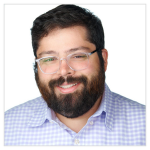Publishing Technology Manager, Science/AAAS
Please tell us a bit about yourself (e.g. hometown, current locale, course of study).
 |
|
I grew up north of Boston in Reading, MA and had been a lifelong New Englander until work brought me to Washington, D.C. I have a degree in journalism from the University of Massachusetts Amherst but spent three years studying electrical and computer engineering. I switched majors late after a particularly frustrating circuit theory design and analysis assignment. Scholarly Communications was not something I was thinking about. It’s an accidental profession for me.
Describe some of your current responsibilities and what type of organization you belong to.
I’m currently the publishing technology manager on the product team at Science/AAAS, part of the publishing side of the non-profit, multidisciplinary scientific society. I manage the publishing platform for Science and the Science family of journals and have input into other technologies used by the publishing group. I really like working at the intersection of publishing and technology and finding ways for stakeholders to work better.
What was your first scholarly publishing role? How did you get that job? What path led to your current position?
My first job in publishing was as an account coordinator on Aries System’s client services team. I supported and helped implement their peer review system and production tracking tool. I had been working as a newspaper reporter for about five years and was ready to make a change. I was open to anything at that point and was attracted to the idea of continuing to use my communications skills and background in technology.
If there was a pivotal moment or key person in your career development, please describe briefly.
I’ve been fortunate to have had some very good and supportive bosses and colleagues along the way that helped me find my footing and branch out. That said, attending my first SSP Annual Meeting is the pivotal moment for me. I was able to volunteer to join a committee which helped me establish my own network of industry folks, make lifelong friends, and opened me up to job opportunities.
What tools, websites, and organizations do you find most valuable for your career development?
I’ll beat the drum for SSP all day, but I also benefited from attending conferences run by ISTME, CSE, PSP early in my career, as well as the Editorial Manager user group meetings. Taking in as much information as possible and meeting people with unique views on the industry has really shaped my perspective and helped me in my career.
What are some of the surprises/obstacles that you’ve encountered during your career?
I’ve always struggled with advocating for myself. Early in my career I stayed in roles longer than I would have liked because I didn’t speak up about where I saw myself fitting into an organization and what I wanted to do. You can do a really good job and people around you won’t know that you’d rather be working on a different project or in a different role. It does not hurt to speak up.
What advice would you give to people interested in a career in scholarly communications?
Participate. Join community groups, show up for webinars, the happy hours, and meet ups. Say yes to volunteering, you’ll meet so many more people and learn so much more about the industry.

